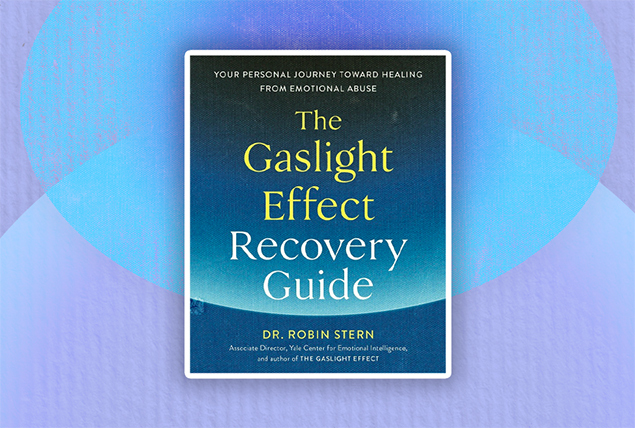Between the Pages: A Spotlight on 'The Gaslight Effect Recovery Guide'

The term "gaslighting" has become so commonplace in recent years that you're likely to hear it several times a week—on television, in podcasts and even in casual conversation. It's so popular, in fact, that it was Merriam-Webster's word of the year in 2022 after the dictionary website saw a 1,740 percent increase in lookups for the term.
The word is bandied back and forth, and misused so often that it can be hard to decipher its true meaning, and even harder to figure out if you are a victim of gaslighting in one of your relationships—whether romantic, family, professional or medical.
Psychologist Robin Stern, Ph.D., co-founder and associate director of the Yale Center for Emotional Intelligence, is here to help. Her new book, "The Gaslight Effect Recovery Guide," helps readers understand gaslighting—a form of emotional abuse—and to better identify whether they are part of this pattern.
In this exclusive Q&A with Giddy, Stern discusses what gaslighting is and what it's not, the different types of gaslighters, how to "turn off the gas" in your relationship and how to recover from gaslighting.
Editor's note: This interview has been edited for length and clarity.
How would I recognize gaslighting?
Stern: As I wrote in my new book, gaslighting is an insidious, sometimes covert, form of emotional abuse, repeated over time where the gaslighter—the more powerful person—leads the gaslightee, the less powerful person, in the dynamic to question their own memory, their judgments, their reality and, in extreme cases, their sanity.
Gaslighting can happen in any relationship with a power dynamic. I use "he" and "she" most of the time to describe gaslighter and gaslightee because most of the time it has been women showing up in my clinical practice complaining about their gaslighter partners. But certainly, women can gaslight, certainly gaslighting occurs in same-sex relationships—and in family and workplace relationships as well as in romantic relationships.
Let me give you a couple of examples.
Alison and Jonathan have been dating for more than six months. They have a lot in common, including hopes and dreams, and they loved being together from their first date. Their romance has been peppered with frequent exchanges of "love you" and "I love you more."
Recently, Alison is feeling worried about the relationship. Nothing dramatic is wrong—except Jonathan travels a lot, and often doesn't answer his phone when she is calling. She thinks it's weird because he always has his phone on when they are together—and always picks it up when there's a call. And one time, about a month ago, she told him she couldn't reach him and said she thought it was weird.
He barked at her, "What's weird, honey, is your paranoia. You know I am traveling on business. Where do you think I was?" His biting tone of voice was something she hadn't heard from him before and she didn't pursue the conversation. But now it has happened several times more—in fact, each week he is gone.
She has braved the question a few times: "Where did you go last night? I really wanted to talk and couldn't reach you" and "Did you have a business dinner last night—couldn't reach you." Each time she got back a cold stare and a question: "I am traveling—that's where I am. Do you hear how paranoid you are?" And then most recently, "You know how much I love you, don't distract us tonight with your insecurity."
She is just starting to wonder if maybe he is right about her—she is, after all, insecure.
Here's another example.
Ann approached her friend Gaby at school one day and asked if Gaby might be angry or upset with her. "You haven't called me in a week. Are we OK? Did I do something to upset you?" she asked.
Gaby said, "Oh, c'mon, you are sooo freakin' sensitive."
It is true that Ann is sensitive, but that still doesn't answer her question or allay her concern. Gaby avoided the question and made Ann's sensitivity the problem. Ann left the conversation still not knowing if Gaby was upset with her and wondering if her (Ann's) sensitivity is getting in her way of seeing things clearly.
These are examples of gaslighting interactions.
Gaslighting is different from disagreement. Discussing and listening to differing points of view respectfully, even when heated, is a healthy form of debate—and helps you define boundaries and build bonds.
Gaslighting is different from trying to influence someone to go along with our plan, not their plan. Exerting influence—as long as it is not undermining your character or your perceptions and leading you to doubt yourself—is not gaslighting.
What are the three stages of gaslighting?
In the beginning, there is disbelief. When your partner says things you think are silly or strange and tells you there is something wrong with you or your behavior or some issue you're not aware of. You dismiss it the first time or the second, but over time, as they keep making the same comments and insisting on their truth, you begin to question yourself and whether they might possibly be right.
The next stage is defense. You are constantly defending yourself and ruminating over and over about what you and your partner (or boss or family member or friend) said to each other. Who is right? Who is wrong? And you can't stand the idea that you may have to walk away—even just from the argument—without your gaslighter seeing your point or thinking well of you.
The final stage is depression. When you're gaslighted for a long period of time, you don't recognize yourself. You're not the same person who walked into the relationship. You are more insecure, more isolated and you are often depressed. You will do anything to avoid triggering your gaslighter and often take on her or his distorted and critical judgment of you.
Are there distinct techniques for gaslighting?
Anyone can become a gaslighter. In my experience, I noticed that gaslighters fall into one of three types.
There is the "glamor" gaslighter. This is where gaslighting can be followed by grand gestures of romance—where your gaslighter convinces you that you and he have your own special world.
Something like this: Your boyfriend was nowhere to be found for days and when you complain he insists that you're crazy—don't you know how much he loves you, aren't you paying attention? He may even show up with flowers and tickets to your favorite musician, and he showers you with love and affection.
Over time, you wonder if it's you. What's wrong with you, that you can't just appreciate someone who lavishes you with love?
Then, there's the "good guy" gaslighter who is very capable of engaging in a seemingly reasonable and calm conversation that leaves you exhausted and confused. Your gaslighter ultimately gets their way while trying to convince you that you're getting what you want. Or, the gaslighter gives in to you and acts miserably and then tells you there is something wrong with you because you aren't happy you got your way.
Here's an example. You argue about going to visit your sister on an upcoming weekend. Your husband doesn't want to go and works hard to get you to change your mind by first telling you that you just saw her recently and that it's a long drive. But you still want to go. Then he tells you that you are way too attached to your family and that if you really loved him, being with him would be enough.
You persist even though you do have the thought that maybe he's right about your over-attachment. He relents and you go. He pouts the whole time, is not engaged in conversation and then is emotionally distant the whole car ride home while telling you there is something wrong with you because you are not more grateful.
Finally, there's the "intimidator" gaslighter who uses whatever they can as an emotional weapon against you:
- Being actively critical and insulting
- Bullying you
- Raising their voice
- And sometimes escalating to yelling and threatening
There is an urgency to their need to be right and not be challenged.
Tell me more about the 'gaslight tango'
The gaslight tango is when your gaslighter invites you into the dance and you unwittingly engage in a tango.
Your gaslighter says something he insists is true, such as, "You know you are so forgetful!"—just like in the movie "Gaslight." Rather than dismissing the comment and avoiding the tango, you defend yourself and give examples of how you are not what he is accusing you of.
Even though you know you are not forgetful, you engage because you can't stand the gaslighter's distorted perception of you. Then, over time, you are worn down, exhausted and no longer sure of what you think. You look for a way for the two of you to be on the same page, so you pivot to his side and accept his reality as your own.
[Editor's note: "Gaslight" was the 1944 classic movie that inspired "gaslighting" as a term now used to describe emotional abuse in a relationship. Directed by George Cukor and starring Ingrid Bergman, the plot has so many twists and turns that it is often mistaken for a Hitchcock film.]
How do you begin to turn off the gas?
Take space from your gaslighter and pause long enough to check in with your feelings and your perceptions and to sort out the truth from distortion.
Write down your last few conversations as best as you can remember. Notice where the conversation pivots away from whatever the topic was to blaming or shaming you.
What do you hope people will take away from your book?
A few things. Anyone can be a gaslighter and anyone can be a gaslightee. Gaslighting is socially learned. People are not born gaslighters or gaslightees.
Gaslighting can be soul-destroying and eats away at your self-esteem, your mental health and well-being, your ability to work and perform at your best, and your identity.
We get into gaslighting relationships—most of the time without awareness because it's insidious and builds over time.
It is not your fault. When we learn the red flags and identify the gaslighting we can take steps to leave if we have to or to limit the gaslighting if we don't want to leave.
You can reclaim your reality by checking in regularly with your feelings and by honoring those feelings. You will need a lot of patience and extra self-compassion.
You can live a gaslight-free life by relying on the information from your emotions, gathering social support, paying attention to red flags of gaslighting and being committed to allowing only people who treat you with caring, compassion and respect to be the ones you spend time with.


















